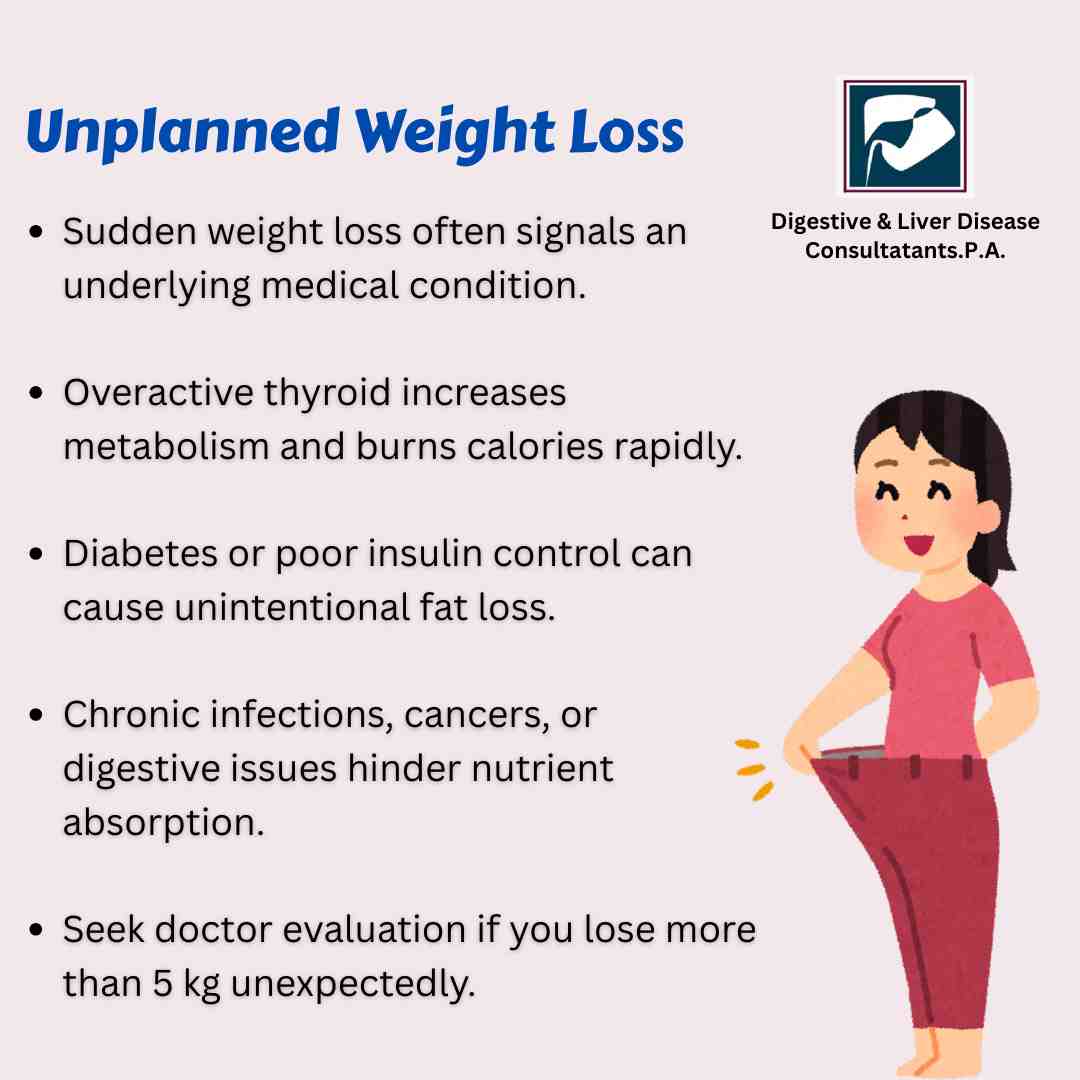Most people welcome weight loss, especially when it happens after consistent effort through diet and exercise. But when you start losing weight without trying, it can be a sign that something deeper is going on in your body. Unexplained weight loss should never be ignored, as it can point to an underlying health issue affecting your digestive system, metabolism, or other vital organs.
If you’ve noticed your clothes feeling looser or the number on the scale dropping without any lifestyle changes, it’s important to understand what might be happening and when to see a doctor.
What Is Unintentional Weight Loss?
Unintentional or unexplained weight loss refers to losing more than 5% of your body weight within six to twelve months without changing your diet or physical activity. For example, if you weigh 160 pounds, losing more than 8 pounds without trying could be concerning.
This kind of weight loss is not just about numbers—it can indicate your body is under stress or fighting an illness. Identifying the cause early helps prevent serious complications and ensures proper treatment.

Common Causes of Unexplained Weight Loss
1. Digestive Disorders
Many digestive conditions can interfere with how your body absorbs nutrients. When your digestive system isn’t working properly, food may pass through without being fully digested, leading to malnutrition and weight loss.
Some common digestive causes include:
- Celiac disease: The immune system reacts to gluten, damaging the small intestine and preventing nutrient absorption.
- Crohn’s disease and ulcerative colitis: Inflammatory bowel diseases that cause chronic inflammation, diarrhea, and nutrient loss.
- Chronic pancreatitis: The pancreas fails to produce enough digestive enzymes, making it hard to absorb fats and proteins.
- Peptic ulcers: Pain or discomfort may cause you to eat less, leading to gradual weight loss.
If you experience persistent bloating, diarrhea, abdominal pain, or fatigue along with weight loss, consult a gastroenterologist to rule out digestive causes.
2. Thyroid Disorders
An overactive thyroid (hyperthyroidism) increases metabolism, causing your body to burn calories faster than normal. Along with weight loss, you may notice other symptoms like a rapid heartbeat, anxiety, sweating, and trouble sleeping. A simple blood test can help diagnose thyroid problems, which are treatable with medication.
3. Diabetes
In people with uncontrolled diabetes, the body cannot properly use glucose for energy. As a result, it starts breaking down fat and muscle to get fuel, leading to unintentional weight loss. Other signs include excessive thirst, frequent urination, and fatigue. If you suspect this, it’s important to get your blood sugar levels checked.
4. Cancer
Unexplained weight loss is sometimes one of the first signs of certain cancers, such as pancreatic, stomach, colon, or lung cancer. The body uses extra energy to fight the disease, and tumors can affect appetite, digestion, or metabolism. While not every case of weight loss means cancer, it’s important to seek medical advice if you lose weight rapidly without reason.
5. Liver and Pancreatic Conditions
The liver and pancreas play vital roles in digestion and metabolism. Conditions like fatty liver disease, liver cirrhosis, or pancreatic cancer can cause loss of appetite, nausea, and nutrient absorption issues. These factors often lead to unexplained weight loss over time.
At Digestive & Liver Disease Consultants, P.A., our specialists frequently evaluate patients experiencing digestive-related weight loss. Our advanced diagnostic tests help identify whether liver, pancreatic, or intestinal conditions are the cause.
6. Chronic Infections
Long-term infections such as tuberculosis, hepatitis, or parasitic infections can cause loss of appetite and fatigue, resulting in gradual weight loss. Identifying and treating these infections is essential to restore health and energy.
7. Mental Health Conditions
Depression, anxiety, and stress can significantly affect eating habits and digestion. People under emotional distress may lose interest in food or experience stomach discomfort that makes eating difficult. Addressing mental health is as important as treating physical causes.
8. Medications or Treatments
Certain medications, including those for thyroid, diabetes, cancer, or depression, can cause side effects like nausea, loss of appetite, or changes in metabolism. If you notice unexplained weight loss after starting a new medication, talk to your doctor about possible alternatives or adjustments.
When Should You See a Doctor?
It’s normal for weight to fluctuate slightly due to stress, illness, or seasonal changes. However, you should schedule a medical evaluation if:
- You’ve lost more than 5% of your body weight in 6 months.
- You have persistent digestive issues such as diarrhea, bloating, or abdominal pain.
- You experience fatigue, weakness, or changes in appetite.
- You notice blood in stool, nausea, or persistent vomiting.
- Early diagnosis is the key to preventing more serious complications.
How Digestive & Liver Disease Consultants, P.A. Can Help ?
At Digestive & Liver Disease Consultants, P.A., we understand how concerning unexplained weight loss can be. Our board-certified gastroenterologists specialize in identifying and treating conditions affecting the stomach, intestines, liver, and pancreas.
We use advanced diagnostic tools such as endoscopy, colonoscopy, imaging tests, and lab evaluations to find the root cause of your symptoms. Once identified, we design a personalized treatment plan that helps restore balance, improve digestion, and promote healthy weight maintenance.
Whether your weight loss is linked to malabsorption, inflammation, or a metabolic condition, our expert team provides compassionate care to help you regain your health and confidence.
Tips to Support Healthy Weight and Digestive Health
Eat balanced meals: Include lean proteins, whole grains, fruits, and vegetables.
Stay hydrated: Water supports digestion and nutrient absorption.
Manage stress: Stress management can prevent appetite loss and digestive flare-ups.
Exercise moderately: Physical activity improves metabolism and boosts appetite naturally.
Avoid skipping meals: Regular eating patterns help maintain stable energy and weight.
Conclusion
Unexplained weight loss may seem like a welcome surprise at first, but it can be a red flag for an underlying health issue. Digestive disorders, thyroid problems, diabetes, or liver diseases are just a few of the many possible causes. Paying attention to your body and getting professional evaluation early can make all the difference.
If you are losing weight without trying or are concerned about digestive symptoms, schedule an appointment with Digestive & Liver Disease Consultants, P.A. Our experienced gastroenterologists provide expert care to diagnose the cause and help you regain your health safely and effectively.






